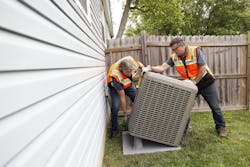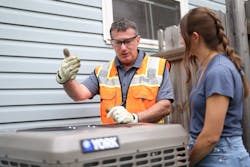Driving Cold Climate Performance with Next-Generation Heat Pumps
Key Highlights
- Next-generation heat pumps can reduce heating electricity use by up to 75%, saving homeowners significant costs, especially in colder regions.
- Proper installation, including load sizing and ductwork quality, is crucial for optimal heat pump performance and energy savings.
- Dual fuel systems combining heat pumps with traditional furnaces provide reliable heating during extreme cold snaps, enhancing system versatility.
Today's innovative, air-sourced heat pumps are delivering substantial value for homeowners — including those living in the coldest corners of the country. Contractors well-versed in this new technology stand to benefit from the sale of these premium systems while helping to transform their customers’ home comfort experience.
Next-generation heat pumps can reduce heating-related electricity use by as much as 75% compared to traditional fuel-burning furnaces or older, electric resistance heating. And in colder regions, like the Northeast and Midwest, that can mean saving as much as $1,000 per year in heating costs.
Many high-efficiency heat pumps also qualify for local, state, and federal rebate programs designed to offset upfront equipment costs. Combined with the reliable performance and precision comfort available from these premium systems, homeowners in all regions now have a compelling reason to switch to electric heating.
Heat Pump Innovations
Today's high-performance heat pumps are engineered to meet a wider heating capacity range compared to what was once expected from legacy systems. However, selecting the right heat pump for the application is important — especialy when working in colder regions.
ENERGY STAR cold-climate designated ratings provide a comprehensive, easy-to-use guide that can be helpful for colder environments. The program requires heat pumps to maintain 70% heating capacity of the system’s full nominal capacity at 5° F. Some premium-tier units can even maintain this capacity in conditions as low as -13° F. Contractors can also look for equipment features that improve cold climate performance. These include variable-speed drive (VSD) and inverter-driven compressors.
Compared to single-stage heat pumps that operate only in an "on" or "off" setting, inverter-driven VSD compressors allow the system to run at a lower, more efficient speed and continuously modulate output. In colder conditions, this extended heating cycle enables the heat pump to extract heat from the ambient air more effectively and pull it inside the home. In all seasons, homeowners receive consistent, precise heating and cooling that is more efficient and more cost-effective to operate.
Delivering Cold Climate Success
Installation also plays a vital role in ensuring successful heat pump operation in colder climates. Load sizing, ductwork quality, and proper airflow are all key considerations that can impact performance.
It is important to understand the maximum heating needs of the home and size the heat pump accordingly. An undersized heat pump can fail to meet the full heating load, and an oversized unit can lead to frequent cycling — both of which can reduce the system's efficiency and performance.
Adequate airflow is also important to maintain efficient heat pump performance. The size and condition of the duct system is essential to maintain sufficient heat transfer. Airflow issues can result in a range of problems. Homeowners may notice hot or cold spots throughout the home, and increased utility costs as the heat pump works harder to maintain capacity. Proper airflow can help to minimize strain on the heat exchanger, reducing premature wear and tear. As a quality check, contractors can look for high-pressure switch faults, which often indicate a duct system problem.
Some regions with extremely cold winters may benefit from a dual fuel system that connects the heat pump to a furnace as a backup heat source. If temperatures drop below the heat pump's efficient heating capacity, the system will automatically engage the furnace for heating. These versatile systems allow homeowners to reap the energy- and cost-saving benefits of an electric heat pump for most of their home comfort needs. When selecting a dual fuel system, it is important to ensure the heat pump and furnace are designed to work together and have been tested and rated for compatibility.
Unlocking Business Growth
Homeowners have a wide range of incentives and rebate options available when choosing high-efficiency heat pumps. Understanding these opportunities can help to create a compelling offer and make these systems more accessible to a broader customer base.
Federal programs like the Inflation Reduction Act (IRA) have made premium heat pumps more affordable by offering homeowners rebates and tax credits for improving energy efficiency. Many states, municipalities, and utility companies are also incentivizing the transition to electric heat pumps. Contractors can use their knowledge of the offers in their area to sell more equipment while meeting their customers' needs.
Contractors have always played an invaluable role in guiding homeowners' HVAC decision-making. As new heat pump technologies emerge, now is an excellent time to expand their knowledge base. Contractors can partner with manufacturers to gain access to resources like rebate databases and homeowner financing programs. Some manufacturers may also offer specialty training that allows contractors to gain hands-on experience with these next-generation heat pumps before installing equipment in the field.
By staying informed on equipment advancements and incentive programs, contractors can confidently guide their customers while growing their businesses.
About the Author
Piero Caballero
Piero Caballero is the senior product manager at JC Residential & Light Commercial LLC.

